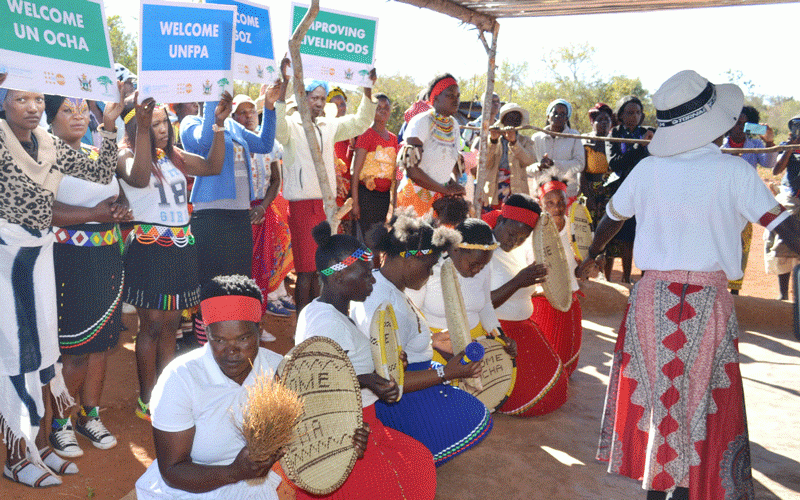
Encountering rape at 69 years has been devastating and horrifying for Senzeni Tshabangu* from Nyamandlovu in Matabeleland North.
This was her second time to be raped.
What makes her story painful is not only her age, but the fact that when it happened, no one believed her, and nothing was done.
Her first sexual assault experience was by someone she knew, a young man in his early 20s, from the same village some years ago.
Tshabangu lives in an area highly associated with illegal gold panning, making it difficult for women of her age to escape the worrying cases of rape which are prevalent.
It is said that the illegal miners believe there is luck in having sexual intercourse with elderly women, hence the higher rates of rape in these mining communities.
“On the fateful day, I was sitting in my kitchen with my sickly mother,” she narrated the events of the day,
“It was already dark and we had just had our supper when suddenly, someone barged in.
- Abducted tourists remembered
- Abducted tourists remembered
- Ex-ZBC journo speaks of ‘hiding’ atrocities
- Making every day that of activism against GBV
Keep Reading
“I tried to check who it was and just as I did, he pushed me to the ground.
"I called him by name and told him he was a disgrace.
“He became angry and started attacking me with an axe all over.”
She revealed the physical scars to this reporter.
Tshabangu said the perpetrator continued attacking her asking if she knew him until she realised she had to pretend not to know him to save herself from further brutal assault.
“When I continuously said I don't know him I was mistaken; he stopped attacking me and overpowered me while I was down, raping me in the process," Tshabangu said while sobbing.
It was evident from her voice and expression as she narrated her story that the events of the day will forever be etched in her heart.
Moreso, she feels betrayed by the community as she called out to neighbours to help her catch the perpetrator before he could flee, but no one came to her rescue.
“I called my neighbour who said I had to wait for daylight to report the issue to the police,” she said.
“I then called the police on their numbers and they said they could not come at night.
“I had to endure the pain silently until dawn, so as not to alarm my sickly elderly mother, who was not aware of what was happening.”
She also called her relatives who live far from her area and they promised to come and assist her, which they did the following day.
The police also came to assist her as promised.
But she still felt betrayed that she had to endure such a painful experience through the night alone.
Thabangu is finding it difficult to recover from what she went through.
The perpetrator was apprehended and, going for court proceedings brought her closer to a recovery path.
She got assistance through the Central Emergency Response Fund (CERF) programme, which seeks to assist victims of gender-based violence.
Through the implementation of multi-sectoral interventions meant to safeguard vulnerable populations at a time the country is faced with drought and the resulting domestic tensions, Tshabangu got some form of reprieve for her haunting ordeal.
The six-month programme was led by the Women Affairs, Community, Small and Medium Enterprises Development ministry in partnership with the International Organisation for Migration, United Nations High Commissioner for Refugees, Unicef and UN Women.
It is being implemented by the United Nations Population Fund (UNFPA) through the Musasa Project.
Under the project, victims were provided with a safe space to share their challenges and in the process, find ways to overcome them.
The safe space is among four key pillars of the programme, which include a shuttle service for survivors of gender-based violence, to enhance reporting and access to services.
Since January, 5 499 survivors, of which 5 348 are female and 601 are males, have accessed the shuttle service in the eight districts supported by the programme.
Speaking during the closeout for the CERF programme, Musasa Project executive director, Vimbainashe Mutendereki, said the programme provides GBV information for women to know where they could get services.
“They would come together through those safe spaces, do livelihood projects, enhance the work that they’re already doing with their own hands, and the idea is, as women become economically empowered, we are able to reduce incidences of gender-based violence,” she said.
“There’s a bit of strengthening of local structures, which for us is very important as we talk about sustainability.
“It is really about making sure that the skills are made available within communities.”
An official in the Women Affairs ministry, Magdalene Chavhunduka, said the project had enhanced the capacity of teams in the districts to prevent and respond to GBV in emergencies.
UNFPA programme analyst, Patricia Mujajati, said the CERF programme ensured mitigation of GBV risk and raise awareness around sexual exploitation and abuse at community level.
“We reached quite a huge number of women and girls and other community members,” Mujajati said.
“We have an issue of leaving no one behind, so we also had a particular focus on persons with disability because sometimes during emergencies, they are usually left out.”
“But we deliberately targeted them to make sure they know about what is happening, where to go to seek services.
“You will find that there’s increased knowledge on gender-based violence, there is increased talk, even among the district stakeholders, about gender-based violence and not just for the gender-based violence specialised actors, but also those that really don’t see gender-based violence every day.”
The government and its partners are strengthening GBV services for vulnerable women and girls in Buhera, Chipinge, Mwenezi, Chiredzi, Hwange, Umguza, Beitbridge and Gwanda.
- The name has been changed to protect the victim.







